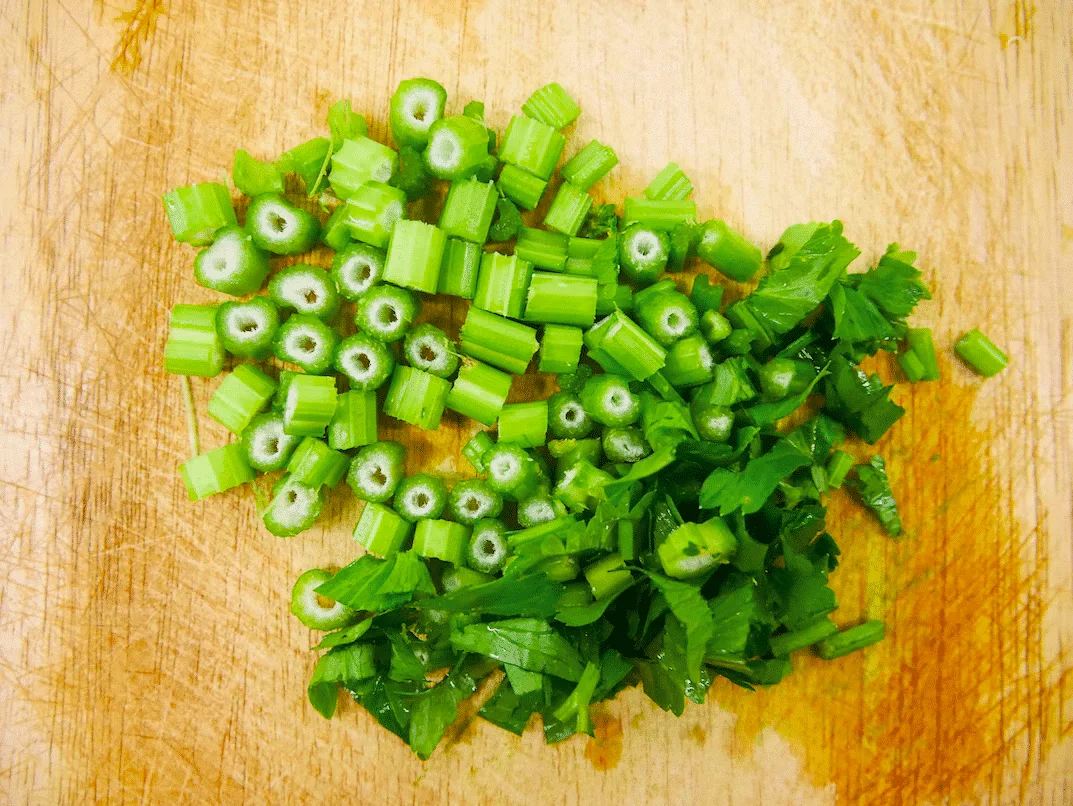Welcome to the world of dogs and celery!
We’ve all heard the advice that human food shouldn’t be shared with our dogs. However, if you’re a dog owner, you’re probably like some of them and have occasionally disregarded that advice and feeding your dog table scraps.
Is it true, for instance, that canines benefit from eating celery? If you’re debating whether or not to feed your dog celery, you should read on so you have all the information you need to make an informed decision.

Want to scamper ahead? Click below
Is it Right for Dogs to Eat Celery?

Dogs can enjoy a nutritious snack of celery.
Most experts agree that celery is fine to feed your dog. There are, however, a few tiny exceptions. Dogs, especially puppies and smaller breeds, should not be given whole pieces because of the risk of choking.
As a further concern, some dog owners avoid feeding their canine companions celery, especially the leaves, out of fear that it can expose their dog to harmful pesticides. The leaves of a plant may have a higher concentration of pesticides and other substances than the rest.
There should be no cause for alarm, provided it is cleansed thoroughly. If you’re worried, feed them the stem without the leaves. Naturally, organic raw vegetables are always the best option.
Add celery to your dog’s diet gradually, like any other new food. This way, you may evaluate how it affects them before committing to providing it regularly, reducing the risk of adverse responses.
What Are the Health Benefits of Celery to Dogs?

Now you know that celery is safe for dogs. However, you may be curious as to whether or not feeding your dog celery has any positive effects on its health. After all, food can be risk-free even if it’s not exactly good for you—think about canine treats like doughnuts and ice cream—they won’t hurt them, but they won’t do anything for their health, either.
Fortunately, your dog may reap the particular nutritional benefits that celery provides. The following are some of the many advantages of feeding celery to dogs:
Low calorie
Celery is a popular food for people watching their calorie intake. For the same reason, celery can be a healthy and tasty snack for your dog.
Celery is a fantastic snack to help your dog lose or maintain a healthy weight. This way, they can have a crunchy snack without overdoing it on the calorie front.
High vitamin content
There are several valuable vitamins in celery. Vitamins K, A, and C all fall under this category.
Your dog needs vitamin K because it aids in blood clotting and promotes healthy bone growth. Vitamin C strengthens their immune system and facilitates healthy stress adaptation. A vitamin A diet will significantly benefit your dog’s eyesight, skin, muscles, and neurological system.
Fiber
Another benefit of giving your dog celery is that it can help you control how much fiber they consume. Feeding your dog a diet high in fiber can aid digestion and prevent tummy troubles.
You may make your dog feel fuller for longer by feeding it fiber. This can be a good option if your dog is overweight or you want to help him slim down. Celery is a low-calorie snack that will keep them full without causing them to go over their daily allotment.
However, because of the high fiber level in celery, it is recommended that you only give your dog a very tiny amount at a time. Overeating can cause stomach issues, such as diarrhea.
Water content
Celery is a vegetable with very high water content, and its electrolyte content makes it very useful for keeping your dog hydrated. This means it can save you a trip to the kitchen to refill your dog’s water bowl if they drink too much. Regularly feeding your dog celery, particularly during the scorching summer months, will help it maintain its average body temperature and fluid levels after a vigorous day in the sun.
Minerals supply
Celery is rich in nutrients, in addition to being a good source of vitamins. To give just one example, it gives your dog the zinc they need to stay healthy.
The immune system of your dog will be bolstered by zinc. It aids digestion and may improve brainpower.
Manganese is another mineral found in celery. Manganese aids in sugar regulation, decreases inflammation, and increases bone density.
Potassium content
It’s well-known that eating celery can increase your potassium levels. It virtually matches the potassium content of a banana. Potassium, an electrolyte, aids in your dog’s hydration and may help avoid muscle cramps.
Maintaining healthy blood pressure, heart, and kidneys can all benefit from getting enough potassium in the diet. Some research suggests feeding your dog celery can help its cardiovascular and renal systems. However, it would be best to never rely solely on a diet to treat these conditions; instead, discuss medication and testing with your veterinarian.
Antioxidants
Antioxidants like vitamin E are abundant in celery (mainly in the leaves). They aid your dog’s immune system and reduce inflammation, which is critical in preventing illness.
When dogs eat a diet high in antioxidants, they reduce their exposure to oxidative stress and could be protected against developing chronic health problems.
What Is the Right Quantity of Celery for Your Dog?

Your dog does not require the extra nutrients in celery to remaining healthy because the food you feed them should already satisfy those needs. Unless otherwise recommended by your vet, celery should only be given as a treat and never in place of a regular meal.
The AKC Canine Health Foundation recommends that treats make up no more than 10% of your dog’s daily food intake. This determines the amount of celery to give your dog a breeze. You need to know how much food and the quantity of treats your dog gets regularly. If you have questions about how much food to give your pet, your veterinarian is another good resource.
What Are the Risk of Feeding Your Dog Celery?
Small dogs, in particular, should not be fed celery because of its choking risk. Before giving it to your dog, chop the celery into little pieces so that it is simpler to chew and you can control the portion amount. Incorporate a novel dog food component gradually, as recommended by veterinarians.
While dogs can consume celery, this does not necessarily guarantee that it is the most beneficial treatment for your canine companion. When uncertain, consult your veterinarian.
Safe Ways to Feed Your Dog Celery

Before giving your dog any piece of celery, wash it carefully and chop it into small pieces. The leaves of organic celery can also be fed to your dog.
When giving your dog cooked celery, be sure it was prepared without any added salt, butter, or potentially hazardous components like onion or garlic. It would be best if you only gave it celery when watching it closely to prevent your dog from choking.
In some cases, you can use celery as a treat for your dog by:
- Serve basic, raw, cooked, or frozen celery cut into manageable bits.
- Chopped celery can be used in the same way as a garnish.
- Spread peanut butter on your dog’s celery, ideally xylitol, sugar-free and salt-free.
Wrapping Up with Can Dogs Eat Celery
Celery is okay for dogs to eat in little amounts, like an occasional treat. Remember that the high fiber level of celery can be a little rough on your dog’s digestive tract if eaten in excess.
The most important thing to remember is to check with your vet before giving your dog any new meals. Even though they could benefit you, your canine companion may not always share your enthusiasm.
Thanks for following along with us! Next up, Can Dogs Eat Pineapples?
Join our Forum for free today!

- Big Cats Love Mouthing Affection - July 22, 2024
- Kind Elephant Merciful To Lion Cubs - July 22, 2024
- Beachgoers Save Massive Shark Stranded In Florida - July 22, 2024


